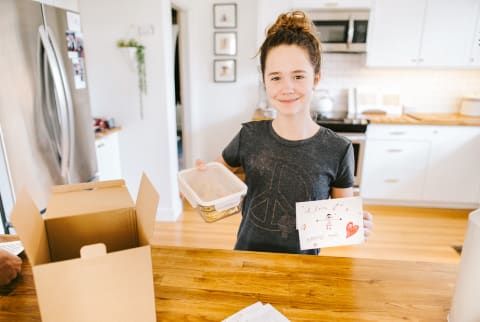Advertisement
5 Ways Kids Can Support The Elderly Population Right Now


In years past, my daughter and her Irish step troop would visit local senior citizen homes, community centers, and hospitals to perform their dance routines. The entertainment energized so many of our loving hosts. But now, as we're social distancing to help flatten the curve of COVID-19, the dance performances are canceled.
Right now, we have to be mindful that the elderly are among the most vulnerable populations during this COVID-19 pandemic. Though sacrificing visits to nursing homes or Grandma's house are necessary, we cannot forget what that time with them might have meant.
So as we continue to promote social connection with friends, we must also continue offering affection to the elderly. Here are some ideas to help your child stay connected to their grandparents or others in the elderly population:
Call a loved one and hear their stories.
Ask your children to call their grandparents and get to know them a bit better. What was life like growing up, and how did it differ from today? What is their favorite story from growing up? How did Grandma and Grandpa meet?
You can record these stories and preserve them for the whole family.
Catalog their best recipes and get advice while cooking.
Recording special family recipes Grandma made was one of my favorite childhood projects—invite your kids to do the same. Cooking also teaches key executive functioning, like organization and planning skills.
After they've written down the recipe, work with your child to cook or bake. Teach them math, science, and planning that goes into it.
Make a family tree.
Much of what we want to know about our family is locked in the memory of our elders. Call your family members and ask them to tell you critical information, then make a family tree for everyone.
Make cards and send them to the elderly.
If your children are looking for something creative to do, making cards for the elderly is a good use of time. They can either send these to a local nursing home or to their grandparents' house.
Coach your child through a phone call to the eldercare facility in order to get the address and prepare the package. This build valuable life and social skills.
Make a home video.
Visualizing a plan helps children build critical future thinking skills. Have them write a script and make a movie to say hello to relatives who are unable to visit right now.
Reaching out to older people in your family or your community may take a bit of creativity, but it helps your child learn to be a helper, practice empathy, and better understand how the coronavirus is affecting people of all ages.











